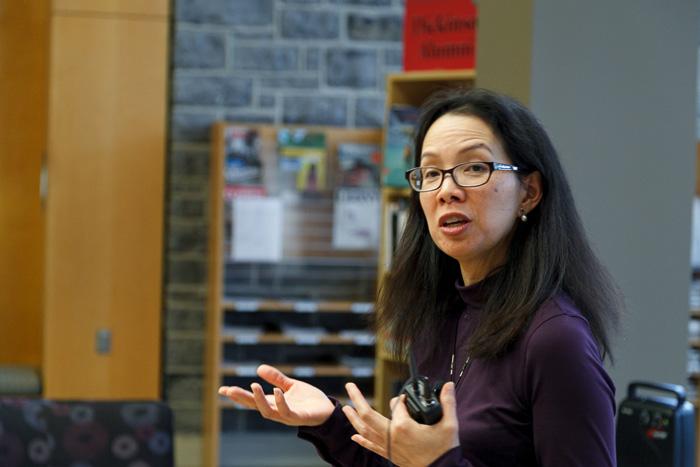Reimagining Trillin's America

Photo by Carl Socolow '77.
Adrienne Su tackles that problematic 'we' in essay and verse
Search the hashtag #HaveTheyRunOutOf and you’ll find pointed satires of Calvin Trillin’s poem, “Have They Run Out of Provinces Yet?” including one by Chef Eddie Huang (Fresh Off the Boat). Published April 5 in The New Yorker, Trillin’s infamous light verse broke the internet with its litany of anxieties over the diversifying Chinese-food menu, delivered in a tone that some have described as tone deaf at best, racist at worst.
Adrienne Su didn’t reflexively enter that chorus. True, the associate professor of English and poet-in-residence is far from the poem’s ideal reader, as a second-generation Chinese-American, working on a book of poetry about Chinese-American food. Su even recently submitted some poems on that subject to The New Yorker, the magazine that published Trillin’s debated lines. But Trillin is not just a longtime journalist and humorist, published regularly in The Nation and The New Yorker for decades; he’s also a food-writing pioneer, and, like many writers serious about food, Su is a fan. So, after a visceral first response, the professor took a breath and read the poem again, scouring Trillin’s lines for irony and harmlessness.
It still gnawed at her.
“The more I read, the more convinced I became,” she says. “And I just couldn’t sleep until I responded.” An hour later, Su had a first draft, and her response poem was published online within days. By month’s end, she’d also published an essay about why Trillin's verse warrants close inspection.
Culinary nostalgia
In Trillin’s poem, the speaker ticks off the varieties of regional cuisines that came into fashion in the U.S. through the decades—Cantonese, Szechuan, Shanghai, Fujian, Xi’an and “others—too many to name.” This, Trillin writes, ushers in “tensions” and “fears” among foodies who sought to keep up with the culinary times:
So we sometimes do miss, I confess,
Simple days of chow mein but no stress,
When we never were faced with the threat
Of more provinces we hadn’t met.
Reading those lines, critics wondered who the “we” in the poem included, and what “threat” Chinese food (and/or provinces) posed. Trillin’s defenders called the critics hypersensitive, pointing to the food writer’s long history as a tongue-in-cheek social critic, his well-established love of Chinese and global cuisine, and a previous poem he wrote about the seemingly overwhelming varieties of French cuisine that did not raise an eyebrow (the counterargument: French and Chinese people and cuisines have different places in American cultural history). Some pointed out that if the longtime poet had published “Have They Run out of Provinces Yet?” a generation ago, no objections would have been raised; at 80, they said, Trillin is simply, innocuously, out of touch.
Out of touch, yes, Su agrees, but not innocuous. For her, the tipping points are Trillin’s use of the word “we” and the days Trillin’s “we” remember, back when Chinese-American food choices were limited. Her own memories of those “simple days of chow mein” couldn’t be more different.
Chow-mein days, revisited
Growing up in Atlanta in the '70s and '80s, Su didn’t know quite how to respond when her white friends asked her to translate from a language she didn’t know or to explain the inevitable red dragon on the Chinese restaurant wall. A second-generation Chinese American who’d never visited her parents’ homeland, she also couldn’t compare the food served in China with the makeshift Chinese meals her mother cooked up at home, substituting locally available ingredients—hot dogs, spaghetti—in place of Chinese sausages and noodles.
Su only knew that those dishes, along with the hodgepodge of neighborhood recipes her mother collected, were the tastes of her childhood. And today, she remembers the joy her parents felt when the foods of Shanghai and Fujian—the home cooking they recalled from years past—became popular in the United States. For her parents, these were the flavors of home.
In her highly personal response poem about the confluence of home, food and identity, Su brings that world, and an unnamed “them” in Trillin’s poem, into sharp focus. Published by the Asian American Writers’ Workshop six days after the April 5 New Yorker was released, “The Chow-Mein Years in Atlanta” describes now poignant childhood pleasures and Su’s parents’ younger, more vital selves; it also recalls the bliss of “none of us knowing what we were called.”
Updated voices
Realizing that any poem’s readership is relatively small, Su next set to work on an essay, “Report from the Field: People Were Upset That People Were Upset," published last week by VIDA: Women in Literary Arts. In the essay, Su argues that it isn’t the poem’s subject that’s objectionable, but its usage—that exclusionary “we.” It’s no longer acceptable, she writes, to address an imagined audience that’s racially exclusionary. Our language needs to keep up with our times.
“It’s our youngest writers who are most in tune with this—my students, for example, instinctively know how to use language inclusively,” she says.
Asked what, if anything, Trillin’s poem has taught her, Su pauses.
“I used to think that my own experiences weren’t unique enough to warrant telling, because there are many [children of immigrants] who have had the same sort of experiences,” she says. “But what this experience tells me is that these stories need to be more widely told.”
Learn more
- “We’re In the Room, Calvin Trillin” (Asian American Writers’ Workshop)
- “Report from the Field: People Were Upset That People Were Upset” (VIDA)
- “Living Quarters”
- Creative Writing at Dickinson
- Latest News
Published May 13, 2016